HMS Severn, a River class offshore patrol vessel, will be be decommissioned by the end of this year, being replaced by HMS Forth.
In a written answer to a question raised by Sir Nicholas Soames, Parliamentary Under-Secretary for Defence Harriet Baldwin stated HMS Severn would be decommissioned in 2017, with Mersey and Clyde following in 2019. As of April 2017, no date has been given Tyne’s decommissioning.
Five Batch 2 Vessels will replace the earlier four Batch 1 vessels and HMS Clyde, a heavily modified Batch 1 vessel currently patrolling the waters around the Falkland Islands.
The Batch 2 vessels are more capable however have been criticised in Parliament for lacking a helicopter hangar, something that will limit utility of the helicopter deck by preventing embarkation of a helicopter for anything other than very short periods; lacking a medium calibre gun and poor value for money.
The vessels were earlier described at a Defence Select Committee meeting as ships “the Royal Navy does not want or need”. It is understood that the Ministry of Defence paid an extra £100 million for new Offshore Patrol vessels in order to satisfy a requirement to pay BAE a minimum of £230 million per year and despite this, the vessels will be much less capable than vessels of similar price.
A house of Commons Briefing Paper explains the agreement:
“In 2009 the Government signed a 15 year Terms of Business Agreement (TOBA) with BAE Systems and Babcock. The TOBA guaranteed BAE Systems a minimum level of surface ship build and support activity of £230 million a year.
This was judged as the minimum level of work possible to sustain a credible warship-building industry in the UK and thus avoid the delays encountered during the Astute class submarine build caused in part by the loss of skilled staff following the gap between Astute and the Vanguard class submarine build. If cancelled the MoD would be liable for industry closure costs and compensation to BAE Systems.”
The government say that the work to build HMS Forth and her sister ships is sustaining around 800 Scottish jobs.
The five new Offshore Patrol Vessels have been ordered to fill a gap in orders after the second carrier and before the Type 26 frigates begin construction. The first of the five new vessels, HMS Forth, is expected to be handed over to the Royal Navy this year.
Minister for Defence Procurement, Harriett Baldwin, said regarding work starting on the final of the five vessels:
“The start of work on HMS Spey, the fifth Offshore Patrol Vessel, is another milestone in a significant programme of work which is sustaining hundreds of jobs in Scotland and the vital shipbuilding skills needed to build the Royal Navy’s new Type 26 Frigates.”
DE&S CEO Tony Douglas said:
“The team at Defence Equipment and Support has driven the successful delivery of the OPV programme; today’s steel cut is a proud moment not only for us, but for the Royal Navy and our industry partners too.
I am looking forward to continuing this long-standing and close relationship when we begin manufacturing for the Type 26 fleet later in the summer.”
The Batch 2 ships for the Royal Navy include some 29 modifications and enhancements over the Amazonas class corvette built by BAE Systems for the Brazilian Navy. The Royal Navy ships are built to more stringent naval standards, with features such as magazine protection, improved hull integrity and fire safety modifications, as well as greater redundancy.
HMS Forth was christened at a ceremony at the BAE Systems Scotstoun shipyard in Glasgow in March this year and will be handed over later this year.



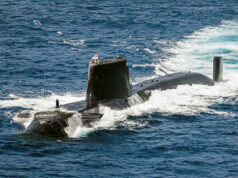
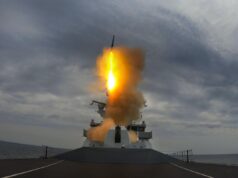
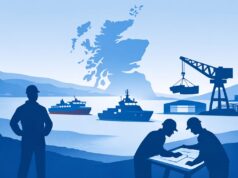


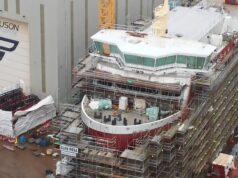
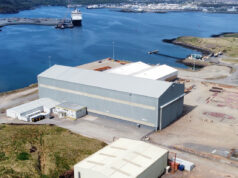
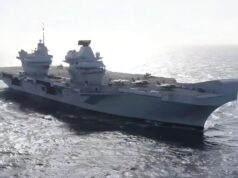
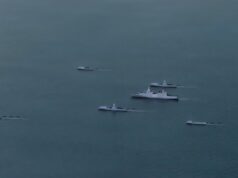
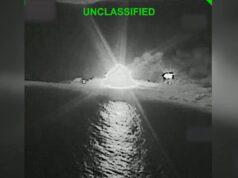

That’s sad. 10 year old vessel decommissioned. Could have used her for solely patrolling uk home waters.
seems the worst fears have come true all river class batch one are going to be decommissioned rather than retained to boast hull numbers.
I would have liked to see them armed with a phalanx 1b and some antiship missiles as a close inshore patrol vessel.
As a former, and very recent, Marine Engineer Officer of all four of the Batch 1 OPV I can say hand on heart they still have at least a decade of usable life.
just a waste no doubt they will be sold for a few pence…and this hold that BAE have over the mod should be scrapped there or other companies out there that could have probably built a better replacement for the money
It’s highlighting one of the rotten things at the core of the current and past defence policy – shortage of personnel. We just can’t crew both these and the new Batch 2s plus the rest of the current fleet. The RN needs more personnel but even if it had them I’m really not sure where the Batch 1 Rivers would fit anyway. I’d rather use extra crew to man more proper escorts which would probably be an extra T31 or two if those ever come along.
We’re stuck with these 5 Batch 2 Rivers and that’s water under the bridge I’m afraid so we have to cut our losses (i.e. don’t build any more) and live with what we have. Having some containerised UAVs that could be embarked (e.g. Schiebel S-100 Camcopter – https://en.wikipedia.org/wiki/Schiebel_Camcopter_S-100) would significantly enhance their utility for anti-piracy and other surveillance and low threat roles and the S-100 can even carry a couple of LMM which actually makes them quite an intimidating presence for pirates, smugglers, etc.
When will we EVER see an increase in the number of hulls!?!? It seems whatever HMG gives the RN on one hand, they take something away from the other. I agree with Mr. Bell that HMS Severn – and the rest of the Batch 1s – could easily be used for coastal patrol at home, relieving some pressure from the rest of the fleet…… this is just penny pinching at it’s absolute worst! This needs to change!
I had hoped that for once the Government would see that we are desperately short of “hulls on the sea” to pinch an old army saying of boots on the ground.
I have no argument with the idea of a smaller , highly capable Royal Navy based on high end warships. However if we are to deploy the equivalent of two carrier battle groups we also need to be able to have ships capable of intercepting pirates, terrorists, drug shipments as well as fishery protection, the safety of oil and gas platforms, illegal immigration and on and on we go.
What about Border Force and the Coastguard and Maritime Agency. Given this weeks tragic events , are we expecting them to cope with a handful of small craft.
We need to stop trying to save a penny which in the long term costs us a pound!
They could have had a Holland class ocean going patrol vessel….. but instead the Royal Navy are anchored to taking whatever stunningly overpriced mediocrity BAE will serve up.
https://en.wikipedia.org/wiki/Holland-class_offshore_patrol_vessel
I like the idea of using OPVs rather than frigates and destroyers for patrol and anti-piracy work in areas where high-level threats are minimal. Base some in Bahrain so that they can patrol the Somali coast. Decommissioning HMS Severn seems premature but I’m hoping that it’s part of a carefully constructed plan and not just a short-sighted cost-cutting measure.
Error, or at best highly misleading wording in the third paragraph…
“Five Batch 2 Vessels will replace the earlier four Batch 1 vessels and HMS Clyde, a heavily modified Batch 1 vessel currently patrolling the waters around the Falkland Islands.”
There are only four Batch 1 vessels INCLUDING HMS Clyde, or you could say that they will replace three Batch 1 vessels and (i.e. “plus”) Clyde, but the paragraph as worded implies 5 vessels being replaced whereas it is only four (Tyne, Severn, Mersey and Clyde).
Surely this is just a cynical move by the government to take the equipment off the batch 1’s and put it on the batch 2’s to save money and pretend they are investing in the fleet. I think Sir Nicolas Soames smells a rat. Since this story is notably missing from the Daily Mail I would agree.
Agree with Mr Bell. And agree with Joe even more! The problem is BAE has the UK government and military by the balls and HMG will always protect the “UK” arms industry over funding the armed forces and getting the balance right between quality and quantity.
Any significance to the fact that there is no decommissioning date announced for HMS Tyne? Perhaps we will have 5 new batch 2’s plus Tyne.
I like the reference to lack of a hangar and lack of medium calibre gun. If it had these, then it wouldn’t be a offshore patrol vessel, it would be a frigate! Ah that’s what the T26 is.. some doughnuts in our parliament. But totally agree that BAE have the system by the nads! This is why I believe the T31/GP Frigate should be built by another competitor i.e. BMT? Come on HMG stop placing all our eggs in one basket for a change!!!!!
I hope the Batch 1’s are not scrapped and are at the very least kept for use in our own waters or are sold to other navies who can make use of them. They could add Sea Ceptor and Brimstone Sea Spear, giving them more capabilities.
As for a future Batch 2 replacement, I’d like to see open competition between BAE and the likes of BMT, Steller Systems and Rolls Royce to deliver an OPV that offers value for money and helps to create jobs (across the country, not just in Scotland) and create new and support existing supply chains.
Stupid idea, esecially with Brexit on the Horizon! We will be needing more patrol vessels than ever.
Having 3 patrol ships patrolling the EEZ, effectively 1 if you apply the rule of threes and assuming 2 will be constantly swapping on station with the Falklands, is just unsustainable. The MMO will get the hump as they wont be getting what they pay for, especially of they are deployed away from fishery protection/enforcement which will be a major issue after Brexit.
I wonder now if it would be the right time to look at Border force taking on all UK fisheries enforcement allowing the RN to focus other tasks and on fisheries Protection and peacekeeping (think more high end disputes) backed up by border force.
This would add around 30 IFCA patrol vessels to customs/immigration work and 9 to fisheries protection and extends the current 30 fisheries vessels to all fisheries enforcement, not just inshore. All these vessels are already in government service and paid for.
In future Possibly add Marine Scotland Compliance along with the Welsh and NI to this, adding around 7 more vessels and more teams. Fisheries could still be a devovled matter, just enforced by a UK agency.
Those teams of shore based fisheries officers could be trained as border officers and vice versa and merged into teams with established border force officers, covering smaller marinas for cutoms, immigration and fisheries enforcement and gathering intelligence on customs and immigration from the relationships they build from people in the fishing industry.